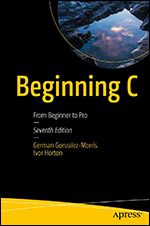C# Programming for Absolute Beginners
- 2h 26m
- Radek Vystavěl
- Apress
- 2017
Get started using the C# programming language. Based on the author’s 15 years of experience teaching beginners, the book provides you with a step-by-step introduction to the principles of programming, or rather, how to think like a programmer. The task-solution approach will get you immersed, with minimum theory and maximum action.
What You Will Learn
- Understand what programming is all about
- Write simple, but non-trivial, programs
- Become familiar with basic programming constructs such as statements, types, variables, conditions, and loops
- Learn to think like a programmer and combine these programming constructs in new ways
- Get to know C# as a modern, mainstream programming language, and Visual Studio as one of the world’s most popular programming tools
Who This Book Is For
Those with very little or no experience in computer programming, who know how to use a computer, install a program, and navigate the web.
About the Author
Radek Vystavel started programming at a young age and has been doing it ever since, as well as sharing it with others. Greatly inspired by Lev Landau and Richard Feynman, Radek has been influenced by their desire to always search for what is the most fundamental in any given situation, and by their courage to be different. Having worked as both a programming teacher in college and privately, and as a programmer, Radek started writing books on programming because many of his students had no previous knowledge of programming and he had difficulty finding a suitable textbook for them. During the years he has gained a unique insight into what is important when teaching beginners.
In this Book
-
Getting Ready
-
Your First Program
-
Dealing with Output
-
Using Variables
-
Working with Objects
-
Using Object Actions
-
More about Objects
-
Input
-
Numbers
-
Economic Calculations
-
Calculations with Dates
-
Understanding Different Kinds of Numbers
-
Accumulating Values
-
Essential Tools
-
Getting Started with Conditions
-
Practical Conditions
-
Compound Conditions
-
Multiple Conditions
-
Advanced Conditions
-
First Loops
-
Improving Loops
-
Number Series
-
Unknown Number of Repetitions
-
Accumulating Intermediate Results
-
Advanced Loops








